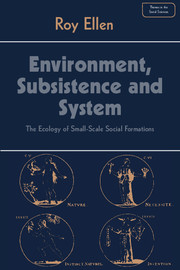Book contents
- Frontmatter
- Contents
- Preface
- Acknowledgements
- 1 ENVIRONMENTAL DETERMINISM AND CAUSAL CORRELATION
- 2 POSSIBILISM AND LIMITING FACTORS
- 3 CULTURAL ECOLOGY AND THE EXPLANATORY IMPERATIVE
- 4 HUMAN ECOLOGY AND THE BIOLOGICAL MODEL
- 5 THE FLOW OF ENERGY AND MATERIALS
- 6 ECOSYSTEMS AND SUBSISTENCE PATTERNS I
- 7 ECOSYSTEMS AND SUBSISTENCE PATTERNS II
- 8 SYSTEMS AND THEIR REGULATION
- 9 INFORMATION AND THE MANIPULATION OF THE ENVIRONMENT
- 10 ADAPTATION: A SUMMARY AND RECONSIDERATION
- 11 THE REPRODUCTION AND EVOLUTION OF SOCIAL AND ECOLOGICAL SYSTEMS
- 12 ECOLOGY IN ANTHROPOLOGICAL METHOD AND THEORY
- Notes
- Bibliography
- Name Index
- Subject Index
8 - SYSTEMS AND THEIR REGULATION
Published online by Cambridge University Press: 05 June 2012
- Frontmatter
- Contents
- Preface
- Acknowledgements
- 1 ENVIRONMENTAL DETERMINISM AND CAUSAL CORRELATION
- 2 POSSIBILISM AND LIMITING FACTORS
- 3 CULTURAL ECOLOGY AND THE EXPLANATORY IMPERATIVE
- 4 HUMAN ECOLOGY AND THE BIOLOGICAL MODEL
- 5 THE FLOW OF ENERGY AND MATERIALS
- 6 ECOSYSTEMS AND SUBSISTENCE PATTERNS I
- 7 ECOSYSTEMS AND SUBSISTENCE PATTERNS II
- 8 SYSTEMS AND THEIR REGULATION
- 9 INFORMATION AND THE MANIPULATION OF THE ENVIRONMENT
- 10 ADAPTATION: A SUMMARY AND RECONSIDERATION
- 11 THE REPRODUCTION AND EVOLUTION OF SOCIAL AND ECOLOGICAL SYSTEMS
- 12 ECOLOGY IN ANTHROPOLOGICAL METHOD AND THEORY
- Notes
- Bibliography
- Name Index
- Subject Index
Summary
SYSTEMS THEORY AND THE ANALYSIS OF ECOSYSTEMS
An aspect of ecological theory which has generated great interest and which is now commonplace in the analysis of small-scale human populations stems from the theory of general systems developed by Ludwig von Bertalanffy (1968). The applicability of this approach rests on the assumption that ecosystems are types of general system and therefore possess their properties; that they are open systems with processes tending towards a harmonious and coordinated ‘steady state’. As such they are held to follow the laws of open-system thermodynamics. Many of the features of ecosystems which suggest this tendency – the idea of climax in vegetation, maturity in soils and grade in geomorphology – have been recognized for much longer; but in the light of systems theory it has become possible to reinterpret such concepts in a dynamic rather than a static manner.
The ideas of systems theory have been employed by geographers (Stoddart 1969:305), archaeologists (D. L. Clarke 1968, Flannery 1968) and anthropologists, as well as biologists, within an ecological context, and with varying degrees of faithfulness, precision and success. Although implicit in some earlier work (Forde 1970:19), among the most influential pioneer work in anthropology has been that of Roy Rappaport, and I will be referring to this in some detail in subsequent sections of this chapter.
Formal and empirical definitions of a system are curiously difficult to formulate, although intuitively the idea is not a difficult one to grasp.
- Type
- Chapter
- Information
- Environment, Subsistence and SystemThe Ecology of Small-Scale Social Formations, pp. 177 - 203Publisher: Cambridge University PressPrint publication year: 1982



